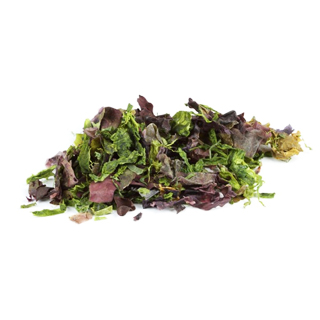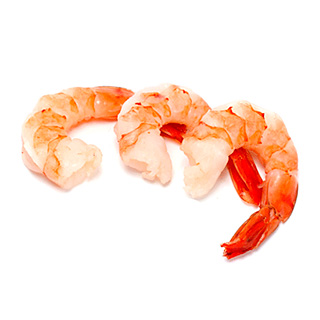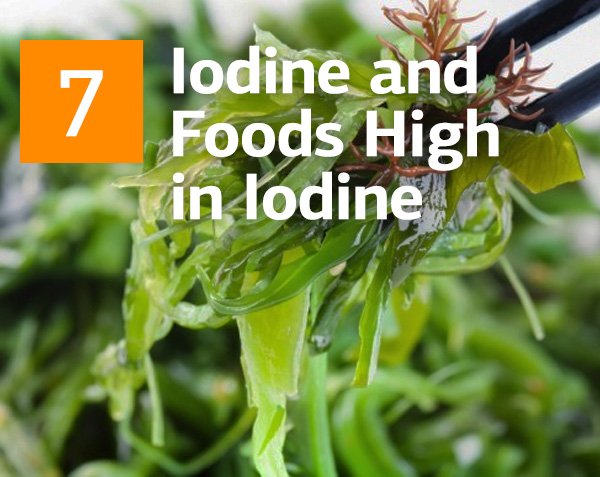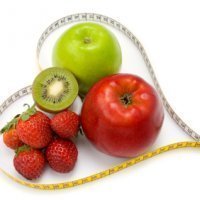Iodine and Top 7 Foods Highest in Iodine
One of the vital biochemical components in our body is iodine. It is needed for synthesis of thyroid hormones that control growth and digestion. An average person’s body usually contains up to 25 milligrams of iodine. 15 milligrams are stored in thyroid gland, and the rest is mainly concentrated in liver, kidneys, skin, hair, nails and ovary. Iodine-containing hormones stimulate growth and development of our body, regulate energy and heat exchange, increase the oxidation of fats, proteins and carbohydrates. These hormones also stimulate the disintegration of cholesterol; they are involved in the regulation of cardiovascular system and are important for development of central nervous system. Useful properties of iodine also include preventing blood clotting and thrombus formation.
The daily recommended need for an adult is 100-150 micrograms of iodine. The need in iodine increases with physical activity, pregnancy and lactation (200-300 micrograms) and during work with substances that suppress thyroid’s functioning (200-300 micrograms).
Iodine from seaweeds is absorbed and retained in our body better and longer, than the iodine taken in a form of supplement.
Iodine in food is lost during storage and cooking. In the process of cooking meat and fish, it is lost up to 50%, in boiled milk – up to 25%, in whole cooked potatoes – up to 32%, and in sliced potatoes – up to 48%. Baked bread loses 80% of iodine, cooked cereals and legumes - 45-65%, cooked vegetables - 30-60%.
Deficiency Of Iodine
As mentioned earlier, average consumption of flavonoids is much less than 1 gram per day (about 250-275 milligrams), with black and green tea serving as the number one source of these phytonutrients. Risk of dietary deficiency for flavonoids is basically synonymous with the low dietary intake of whole, natural foods, and in particular, low intake of vegetables and fruits. By far your best way to ensure ample flavonoid intake is to maximize your intake of whole natural foods, including fresh, brightly coloured vegetables and fruits whose flavonoid pigments provide them with their vibrant colours. This approach sounds simple, but it is a great method for increasing flavonoid intake. Overconsumption of processed foods, overcooking of foods, and low consumption of fresh vegetables and fruits are the primary circumstances related to deficiency. Flavonoids deficiency can be directly associated with poverty and general lack of access to fresh foods.
Dietary Toxicity Of Iodine
There is no evidence that dietary flavonoids can be directly toxic, even in meal plants that contain an abundance of fresh vegetables and fruits as well as an abundance of nuts, seeds, beans, legumes, and whole grains. In addition, since flavonoids are water-soluble, we would expect them to follow a pattern associated with other water-soluble nutrients. That pattern involves lower risk of toxicity than is associated with fat-soluble nutrients
Foods High IN Iodine
1. Sea vegetables

| Dulse wild atlantic sea vegetable | |
| 100 g | 1 cup (64 g) |
| Iodine: 15 mg (15000% DV) |
Iodine: 9.6 mg (9600% DV) |
Only 1 tablespoon of this sea delicacy comprises the iodide your body can use for 5 days.
That is why sea vegetables are an excellent and indispensable remedy for treatment and prevention of thyroid gland diseases. They also are beneficial for patients with coronary heart disease and recommended by doctors for decreasing high blood pressure and atherosclerosis.
If we talk about side effects of sea vegetables, there are none. In addition to their other health advantages, sea vegetables help human body to clean out toxins and reduce cholesterol.
2. Cod

| Cod, atlantic | |
| 100 g | 1 fillet (231 g) |
| Iodine: 0.12 mg (120% DV) |
Iodine: 0.28 mg (280% DV) |
The next excellent source of iodine is cod. A 100 gram serving can provide our body with more than 120% of its daily need. Besides, cod contains large amounts of vitamin B12. It is a perfect dish for those who are counting calories, since the last ones, as well as fats are included to cod fillet in very small quantities. Among other important nutrients comprised in this fish are vitamin D and omega-3 fats. Cod is also high in vitamins A, B, and C, and nutrients such as calcium, sodium, zinc and phosphorus. But especially popular, because of its tender taste and valuable health benefits, is cod liver oil. Scientists recommend pregnant women to consume it starting from the second trimester. Taken on a regular basis until childbirth and later, during the whole period of breastfeeding, it will help the baby develop high intellect in the future.
3. Yogurt

| Yogurt, fruit variety, nonfat | |
| 100 g | 1 cup (245 g) |
| Iodine: 0.02 mg (20% DV) |
Iodine: 0.05 mg (50% DV) |
One cup of yogurt contains almost half of your daily iodine need. Compared to other dairy products, yogurt with no doubt can be called the most useful and popular among them. It helps to restore the natural balance of our body. It has a wonderful nutritional composition of minerals like fluorine, copper and iodine, vitamins like B complex, which stimulate the energy production and have a positive effect on our nervous system, skin and metabolic processes, protein and beneficial microorganisms. Yogurt is even higher in calcium than milk. Nutritionists recommend drinking it before going to bed.
4. Shrimps

| Crustaceans, shrimp, mixed species | |
| 100 g | 3 oz (85 g) |
| Iodine: 0.03 mg (30% DV) |
Iodine: 0.025 mg (29% DV) |
A 100 gram serving of this delicious seafood includes 30% of our daily iodine value. Besides that, shrimps are a great source of easily digestible protein. Due to the high concentration of omega-3 fats and 6 acids, shrimps have lots of useful properties. They are essential for maintaining healthy heart and blood vessels. Thanks to the huge amount of vitamins and minerals’ availability, shrimps have some other very important properties. For example, they are able to establish normal operation and rapid cell regeneration, as well as improve the appearance of skin, hair and nails. High concentration of iron makes shrimps a perfect means for increasing productivity.
5. Cow's milk

| Milk, fluid, 3.7% milkfat | |
| 100 g | 1 cup (244 g) |
| Iodine: 0.02 mg (20% DV) |
Iodine: 0.05 mg (50% DV) |
100 milliliters of grass-fed cow's milk comprises 20% of your daily iodine need. Potassium, calcium and vitamin B12, which milk contains, have a positive effect on cardiovascular system and regulate metabolism. Due to the large amount of fat and protein, milk is a perfect remedy for recovering after physical and mental stress. It is often used as a dietary product. Milk helps treating cold, flu and angina. A glass of warm milk with honey and butter perfectly helps cure sore throat and softens cough. In cooking, milk is used for making sauces, cereals, pastries, pickles, cocktails, drinks with coffee and other foods.
6. Eggs
.jpg)
| Egg, whole, fresh | |
| 100 g | 1 medium (44 g) |
| Iodine: 0.018 mg (18% DV) |
Iodine: 0.008 mg (8% DV) |
Eating an egg in the morning will ensure that your body gets 18% of its daily iodine need.
All the parts of egg are valuable, even the shell, which is used as a dietary supplement of calcium carbonate. Yolk and white are equally health beneficial, so the whole egg should be eaten. For example, egg white is perfectly absorbed by our body, as it contains a complete set of amino acids, and digested better and faster than meat and fish. That is why boiled eggs are the first food of animal origin, which is recommended to eat after being on a diet. Yolk is not less nutrient, than white. It contains such vital elements as vitamin B3, which stimulates brain and improves blood circulation. The ideal balance of nutrients, vitamins and fats in eggs make them the top diet product that will help your body to lose weight and cause no side effects.
7. Strawberries

| Strawberries | |
| 100 g | 1 cup, whole (144 g) |
| Iodine: 0.006 mg (6% DV) |
Iodine: 0.009 mg (9% DV) |
A cup of strawberries contains 9% of your daily iodine value. This berry is also rich in glucose, fructose, sucrose, pectin, vitamins A, C, and several minerals like iron, copper, cobalt and manganese. It's no secret that these nutrients are easily destroyed in the process of cooking. But strawberries do not need any processing. We can eat these delicious berries simply washed with water and be sure that all the nutrients will go into the body.
Strawberry is extremely useful to those who need to strengthen the immune system. Studies have shown that components included to strawberries reduce risks of various diseases, especially for smokers, and for fans of alcohol.









